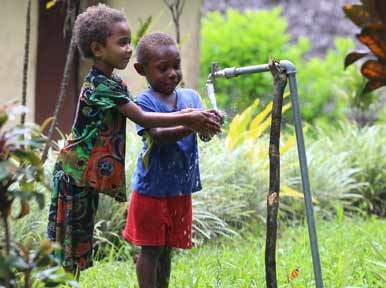Overall, the Pacific Island Countries (PICs) continue to lag behind the rest of the world in access to adequate water, sanitation and hygiene services. This is largely due to the geographical, socio-cultural, and economic diversity of the region. Geographically, PICs span across approximately 3,500 miles of the Southern Pacific Ocean and are impacted by significant climate challenges and the effect of extreme weather events such as tropical storms, drought, heavy rainfall, and flooding, as well as hardships related to rising sea levels. Many are located in the Ring of Fire and prone to earthquakes, volcanic eruptions, and tsunamis.

PICs common features are their isolated geography, small and predominantly rural populations relying predominantly on agriculture, limited resources, market economy, and diverse cultures. Human development indices vary throughout the region. Moreover, expanding settlements, inadequate solid waste disposal, and water pollution limit access and decrease quality and quantity of drinking water resulting in the impairment of human health, well-being and socio-economic development. Significant disparities exist in WaSH service provision, between, as well as within countries. These biophysical and social vulnerabilities, such as fragile environments, limited land resources, shortages of basic resources and limited ability to respond make the provision of drinking water, sanitation and hygiene services challenging.
The Water Institute’s collaboration with the UNICEF Office for Pacific Island Countries aims to strengthen national WaSH systems (including monitoring) in Fiji, Kiribati, and the Solomon Islands. In Fiji and Kiribati, baseline data collection, analysis and reporting on WaSH in health care facilities takes place in collaboration with the Ministries of Health. In the Solomon Islands, data on WaSH in rural and urban households, WaSH in schools, and WaSH in health care facilities will inform programming and resource allocation by the Solomon Islands Government to improve WaSH service delivery.
Water Institute Researchers
Jamie Bartram – Principal Investigator
Carmen Anthonj – Lead Researcher, Postdoctoral Research Associate
Ryan Cronk – Postdoctoral Research Associate
Lisa Fleming – Research Assistant
Amy Guo – Research Assistant
Research Products
- Comparing Urban and Rural WaSH: Evidence from the Solomon Islands. 2018. Tikoisuva, W.M., Anthonj, C., Thakkar, M.B., Cronk, R., Beaudry, G. Shields, K.F., and J. Bartram. Poster at the 2018 UNC Water & Health Conference: Where Science meets Policy in Chapel Hill, USA, November 2018.
- Environmental Health Conditions, Water, Sanitation, Hygiene and Waste Management in Health Care Facilities in Fiji. Census Report. Anthonj, C., Fleming, L., and Cronk, R. 2019. The Water Institute at UNC, Chapel Hill, NC, USA. 81 pages. (report for Ministry of Health and Medical Services and UNICEF Pacific, Fiji)
- Environmental Health Conditions, Water, Sanitation, Hygiene and Waste Management in Health Care Facilities in Kiribati. Report of Preliminary Results. Anthonj, C., and Guo, A., 2019. The Water Institute at UNC, Chapel Hill, NC, USA. 57 pages. (report for Ministry of Health and Medical Services and UNICEF Pacific, Kiribati)
- Solomon Islands Rural Water, Sanitation and Hygiene Baseline Report. 2017. Shields, K.F., Cronk, R.D., and Abebe, L. The Water Institute at UNC, Chapel Hill, NC, USA.
- Solomon Islands Urban Water, Sanitation and Hygiene Baseline Report. 2018. Anthonj, C., Fleming, L., Shields, K.F., and Cronk, R. The Water Institute at UNC, Chapel Hill, NC, USA. 59 pages.
- Solomon Islands Water, Sanitation and Hygiene in Schools Census Report. 2018. Anthonj, C., Fleming, L., and Anderson, D. The Water Institute at UNC, Chapel Hill, NC, USA. 67 pages. (report for Ministry of Education, Solomon Islands and UNICEF Pacific)
- Urban and rural sanitation in the Solomon Islands: How resilient are these to extreme weather events? 2019. Fleming, L., Anthonj, C., Thakkar, M.B., Tikoisuva, W.M., Manga, M., Howard, G., Shields, K.F., Kelly, E., Overmars, M. and Bartram, J. Science of the Total Environment. 683: 331-340. https://www.sciencedirect.com/science/article/abs/pii/S0048969719322946